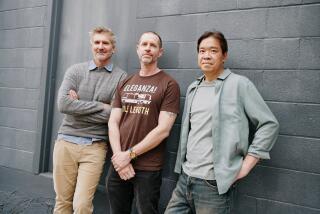Who Is Bei Ling and Why Is Beijing Afraid of Him?
- Share via
On Aug. 11, poet and journal editor Bei Ling, a Chinese citizen and permanent U.S. resident living in Boston, was arrested by the Beijing Public Security Bureau. He has yet to be charged with a crime, yet no one has been allowed to see him. Those who have tried to see him have been told that his detention has to do with an “illegal and unlicensed publication” that has “political problems.” Bei Ling’s detention has become a chilling episode for anyone concerned with open scholarly inquiry, freedom of artistic expression and academic freedom.
The publication in question is Tendency Quarterly, which Bei Ling has published with his co-editor and fellow poet Meng Lang in Boston since 1993. It is a highbrow Chinese-language scholarly journal. Despite its English-language title, it is neither tendentious, as it represents no particular ideology or viewpoint, nor is it quarterly, as funding difficulties have resulted in only 13 issues to date. Tendency, which usually runs to 300 to 400 pages in a high-quality book format, has a circulation of 2,500 to 3,000. The paid subscriptions are mostly to libraries, scholars and academic departments, and approximately 500 copies are sent free of charge to influential authors, critics and scholars in China, the United States, Hong Kong, Taiwan and elsewhere.
To save money, Bei Ling and Meng Lang recently decided to have Tendency printed in China. Contract manufacturing in China for reexport is common for everything from toys to components and, not surprisingly, it is cheaper to print a Chinese-language publication in China than in the United States. Bei Ling and Meng Lang did not intend to change the distribution arrangements, as they knew that Tendency would lose its independence if it were licensed for subscription by individuals in China. And up to that time, the free distribution of a few hundred copies to a few select individuals in China, out of a population of more than a billion, had not met with the Chinese authorities’ opposition.
Before leaving the United States for China, Bei Ling called my wife, Chinese author Yan Geling, a longtime reader and sometime contributor to Tendency, who had recently made an extended trip to China. Bei Ling asked her whether she thought it was safe for him to go. Geling assured him that there was no problem. True, she has had some unpleasant incidents of late: a TV appearance was canceled in retaliation against Joan Chen’s banned film “Xiu Xiu: The Sent-Down Girl,” which is based on Geling’s work; a literary prize she had won in her home city of Shanghai was denied her at the last minute because the authorities decided she was “not Chinese,” even though her passport clearly states she is a citizen of the People’s Republic of China; and her main publisher in China, Bu Laohu, had recently been shuttered after it published a controversial novel called “Shanghai Baby.” But so far all these incidents had caused her only annoyance, inconvenience and some financial loss. At no time did she feel any action of the authorities was a threat to her personal safety.
Bei Ling went to China, found a printer and printed Tendency in China. On Aug. 11, he invited a number of readers and contributors to a cafe near Beijing University to attend a discussion forum and party to celebrate the first printing of the journal in China. After a long wait, the guests found it rather odd that Bei Ling was a no-show at his own party. Then they discovered that he had been arrested and the entire print run of Tendency had been confiscated.
So, who is this dangerous man, and what is the nature of his subversive activity? Bei Ling, born Huang Beiling in 1959, is a native of Beijing and a graduate of the Beijing Financial and Trade Academy. He started writing and publishing poetry in the late 1970s during his college years. He came to the United States in 1988 to participate in a literary exchange with a Chinese-language newspaper in New York City and decided to stay after the 1989 Tiananmen Massacre. Settling in Boston, he has supported himself through writing and teaching as well as by grants and fellowships.
I first met Bei Ling in Berlin in 1998, when my wife and I attended the Berlin Film Festival to promote the film “Xiu Xiu: The Sent-Down Girl.” Bei Ling was on a fellowship for a writers’ retreat held in a refurbished castle somewhere in the former East Germany. he was rather meek and unassuming in person. A quiet man with shoulder-length hair and round glasses, he struck me as a thin, bookish, Asian version of John Lennon. I got to know Bei Ling a bit better later that year, when he stayed with us for a few days on a trip through the San Francisco Bay Area. My strongest impression of his visit was that for all his talents, he was helpless with both English-language keyboarding and Chinese-language word processing software.
So much for the dangerous criminal we harbored. Now to the nature of his subversive publication. My impression is that it is similar to Phi Beta Kappa’s journal The American Scholar, only more literary, more devoted to cultural exchange, much longer and in Chinese. Whereas The American Scholar is eclectic because it prides itself in being a generalist publication for those who love the English language and aren’t afraid to be intelligent, Tendency is eclectic because it carries the entire weight of free expression in Chinese literature and the humanities. Only one other publication like it exists, Jin Tian (Today), and it is also published outside China.
Tendency has made tremendous contributions to Chinese arts and the humanities in its 13 issues. It has published exclusive interviews and first-time Chinese translations of the works of literary luminaries, among them Nobel Laureates Seamus Heaney, Nadine Gordimer and Czeslaw Milosz. Past issues have included an interview with Czech president and playwright Vaclav Havel, Chinese translations of works by Nigerian Nobel Laureate Wole Soyinka, reflections on the Holocaust with contributions by Elie Wiesel and the late Primo Levi and a series of articles commemorating Russian American poet and former U.S. Poet Laureate Joseph Brodsky. A glance through the English-language table of contents of past issues shows contributions from prominent Chinese and Western scholars on the following topics: “Confucianist Transcendentalism and Its Religious Dimension,” “Fin de Siecle Anxiety: the Situation of Literature in Chinese,” “Memory and Remembrance in Tang Dynasty Poetry,” “Heteroglossia of Contemporary Taiwan Art in the Post-Martial Law Era” and “Chinese Modernity in a Transnational Era.” Each issue also contains liberal doses of poetry, fiction, drama and literary criticism.
If the Chinese authorities consider this sort of publication to be a criminal activity, then the concept of true academic freedom must be a complete anathema to them. And if a bookish, sensitive poet and editor such as Bei Ling is considered a criminal, then God knows where that leaves the rest of us.
Tendency has made an important contribution to culture, cultural exchange, social discourse, free expression, academic debate and inquiry. People like Bei Ling and Meng Lang deserve to be commended and supported, not arrested and imprisoned. It would be a sad day for humanity, particularly for the one-fifth of humanity that speaks Chinese, if this high-minded forum for the open exchange of ideas and art were to be permanently silenced by brute force.
More to Read
Sign up for Essential California
The most important California stories and recommendations in your inbox every morning.
You may occasionally receive promotional content from the Los Angeles Times.










